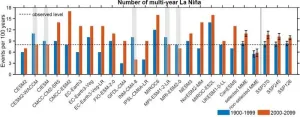(Press-News.org) CLEVELAND - Pancreatic cancer is one of the most difficult cancers to treat, being highly resistant to chemotherapy.
However, there are no effective alternative therapies to chemotherapy, so chemo remains the best available treatment.
Although there are fewer than roughly 60,000 new cases of pancreatic cancer diagnosed annually in the U.S., about 95 percent of people with it die from it, mainly because it often goes undetected in early stages.
Approved multi-agent chemotherapy regimens offer a marginal advance over single-agent treatments, and resistance to these “cocktails” virtually always develops. Multi-agent chemo offers a median survival benefit of roughly four months over a single-agent. Overall, median survival of patients with metastatic pancreatic cancer in the modern era is just eight to 11 months, and the five-year survival rate is around 3 percent.
Physicians hope that adjuncts, or added chemical formulations, may be discovered in the future to improve the effectiveness of chemotherapy against this disease and improve survival outcomes.
In a new study, published June 28 by the prestigious science journal Nature Communications, researchers from University Hospitals Seidman Cancer Center and the Case Comprehensive Cancer Center report that a hyperglycemic state – that is, one where the blood glucose level is raised – made pancreatic cancer more sensitive to chemotherapy in a mouse model. (Pancreatic cancer is more formally known as Pancreatic Ductal Adenocarcinoma and shortened as PDAC). Results were replicated in cell culture and a cohort of patients with metastatic PDAC.
These findings present a potentially new method of making chemotherapy more effective against pancreatic cancer, according to the paper’s senior author Jordan Winter, MD, Director Surgical Services, University Hospitals Seidman Cancer Center, John and Peggy Garson Family Endowed Chair in Pancreatic Cancer research and Jerome A. and Joy Weinberger Family Master Clinician in Surgical Oncology.
“Sensitization of tumors to chemotherapy using forced hyperglycemia offers a completely novel therapeutic strategy. Our findings reveal an approach that would have relatively low-cost and could be easily tested in patients with pancreatic cancer,” said Dr. Winter. Over the past three decades, pancreatic cancer researchers have yet to find new effective targeted therapies. However, if relatively simple interventions can be administered that can greatly enhance the effect of conventional drugs, then patients stand to benefit. Importantly, this advance would potentially bypass the usual cost and time required to develop new therapeutics. This could save over a decade of time and more than $1 billion, based on drug development data.
In the study, the researchers validated a prior clinical study by the same authors that showed patients with localized pancreatic cancer and elevated glucose levels were more responsive to chemotherapy. For the current study, the researchers examined the impact of glycemic status on another group of patients treated for metastatic pancreatic cancer. About 33 percent of the patients had elevated glucose levels (at least one glucose reading above 200 mg/dL). There were no appreciated demographic differences between normal (99 mg/dL or lower) and high glucose patients. A greater proportion of patients in the high glucose group had a documented diagnosis of diabetes.
The median overall survival among all patients who completed at least two cycles of chemotherapy was approximately 9.8 months in all the patients, on par with historical clinical trial data. Further analysis showed, however, that patients in the high glucose level group had a nearly 40% lower risk of dying, despite a higher level of a cancer antigen (CA19-9, which is a measure of disease burden), as compared to patients in the normal glucose group.
“Notably, no associated survival difference was observed based on glucose levels in an independent cohort of metastatic patients who did not receive treatment, suggesting that the interaction with glycemic status may be present only for patients who receive chemotherapy,” said lead author Ali Vaziri-Gohar, PhD, of the Case Comprehensive Cancer Center at Case Western Reserve University at the time of the study and now with the Stritch School of Medicine, Loyola University Chicago,
Paired with prior cell culture and clinical data, these clinical data indicated that a high-glucose state could sensitize PDAC to conventional chemotherapy.
The researchers followed up on these findings with a series of well-controlled studies in various mouse PDAC models of hyperglycemia. First, they induced hyperglycemia pharmacologically with a drug called streptozotocin (STZ). In another group of experiments, they induced hyperglycemia through diet, allowing mice to drink highly sweetened water at will.
In experiments with grafted PDAC tumors on hyperglycemic mice, the researchers found greater sensitivity to single-agent chemotherapy in the two independent models of mice with hyperglycemia. As observed previously with patients in the absence of chemotherapy, no significant differences in growth rates were observed with hyperglycemia compared to mice with normal blood sugar levels in the absence of chemotherapy exposure. The researchers also tested a multiple agent chemotherapy to replicate what a patient might receive today and validated that hyperglycemia alters the metabolic state within tumors to sensitize it to treatment.
“We show that the effectiveness of diverse chemotherapies was markedly improved under high glucose conditions, as compared to low glucose conditions. In some instances, the mice appeared to be cured of their cancer, while mice receiving the same chemotherapy under normal glycemic conditions had relatively little benefit” said Dr. Winter. How can this observation be translated to patients? In the clinical setting, tumors can be theoretically ‘primed’ for chemotherapy by inducing a forced hyperglycemic state, just as we did in mice. In theory, glucose levels can even be modified more precisely through intravenous dextrose infusions (combined with rigorous inpatient glucose monitoring) at the time of chemotherapy administration.” The next step is to implement a clinical trial. Dr. Winter notes that “our patients need better treatment options urgently. Therefore, we are already getting to work designing a trial to treat patients safely with intentionally elevated blood sugars, and will determine if this strategy can improve patient outcomes.”
The study, “Increased glucose availability sensitizes pancreatic cancer to chemotherapy”, was funded by grant support from by the National Institutes of Health funding to the Case Comprehensive Cancer Center; American Cancer Society; and donors to the UH pancreatic cancer research program.
In addition to UH and CWRU, other institutions involved included Thomas Jefferson University, Philadelphia; Texas A&M University, College Station, Tex; SCIEX, Framingham, Mass.; Cleveland Clinic; University of Michigan School of Medicine, Ann Arbor, Mich.; University of Pittsburgh; Wistar Institute, Philadelphia; Oregon Health and Science University, Portland, Oregon, and Stritch School of Medicine, Loyola University Chicago.
END
Study in journal Nature Communications finds high blood glucose levels sensitizes pancreatic cancer cells to chemotherapy
Researchers from University Hospitals Seidman Cancer Center and Case Western Reserve University see finding leading to potential adjunct agents for improved outcomes with chemo
2023-07-26
ELSE PRESS RELEASES FROM THIS DATE:
Global wildlife trade risks altering evolutionary history and ecosystem function, study suggests
2023-07-26
Some of the world’s most distinct and ancient animal species, which play crucial roles in our planet’s ecosystems, are exploited for the wildlife trade across large parts of the world, according to new research from the University of Sheffield.
The study, led by researchers from the University’s School of Biosciences, has found that in large areas of the world, a wide range of functionally and evolutionarily distinct species are targeted for the wildlife trade, which has the potential to cause major losses of evolutionary history and alter key ecological processes.
Published in Nature, the ...
For people with diabetes, healthy eating is not enough if their diet is rich in ultra-processed foods
2023-07-26
The very first rule for people diagnosed with type 2 diabetes is to eat a healthy nutritious diet. Attention to ingested calories, as well as nutrients contained in various foods, become integral parts of a diabetic person's life. However, this might not be enough: an important role in determining the future health status of people with this condition could be played by the degree of processing of foods that end up on the dish. These products are described as "ultra-processed" and are associated with adverse health outcomes, as reported in general population studies.
A study conducted by the Department of Epidemiology and Prevention at the I.R.C.C.S. Neuromed in Pozzilli, ...
Keck Hospital of USC receives highest rating on national quality report
2023-07-26
LOS ANGELES, CA — Keck Hospital of USC earned five stars, the highest rating possible, on the Centers for Medicare & Medicaid Services (CMS) 2023 quality star rating report.
Only approximately 16% of hospitals across the country, 483 out of 3,076, received five stars out of a one-to-five-star rating system.
“This prestigious designation demonstrates our continuing commitment to patient safety and to best patient outcomes, and is the result of the hard work of every physician, nurse and staff member at the hospital,” said Stephanie Hall, MD, MHA, chief medical officer ...
Earlier and earlier high-Arctic spring replaced by “extreme year-to-year variation”
2023-07-26
About 15 years ago, researchers reported that the timing of spring in high-Arctic Greenland had advanced at some of the fastest rates of change ever seen anywhere in the world. But, according to new evidence reported in the journal Current Biology on July 26, that earlier pattern has since been completely erased. Instead of coming earlier and earlier, it seems the timing of Arctic spring is now driven by tremendous climate variability with drastic differences from one year to the next.
“As scientists we are obliged to revisit previous ...
Mapping mass shootings in the United States
2023-07-26
The United States has more than 10 times the number of mass shooting incidents than other developed countries, yet little research has shown the distribution and types of shootings, geographically.
“I’m constantly asked, ‘What is public health doing about the rise in mass shootings?” says Leslie Barnard, MPH, a student working with the University of Colorado School of Medicine’s Firearm Injury Prevention Initiative.
Barnard, a doctoral candidate in the Department of Epidemiology in the Colorado School of Public Health at the CU Anschutz Medical Campus, wanted to find answers to address public ...
Eight out of ten child deaths in low-income countries could be prevented
2023-07-26
Eighty-two percent of child deaths in low-income countries could be prevented, according to a study from the international CHAMPS network published in JAMA Network Open. The study, which used the minimally invasive autopsy technique developed by the Barcelona Institute for Global Health (ISGlobal), found an infectious agent in 87% of cases and identified malnutrition as the most common underlying cause of death.
Ninety-nine percent of deaths in children under five years of age occur in low- and middle-income countries. "If we want to prevent these deaths, we need to know the causes, but the problem is that we lack reliable data," says Quique Bassat, ...
Use of wastewater metrics to track COVID-19
2023-07-26
About The Study: The findings of this study including 268 counties in 22 states suggest that wastewater surveillance can provide an accurate assessment of county SARS-CoV-2 incidence and may be the best metric for monitoring amount of circulating virus as home testing increases and disease acuity decreases because of vaccination and treatment.
Authors: Meri R. J. Varkila, M.D., of Stanford University in Palo Alto, California, is the corresponding author.
To access the embargoed study: Visit our For The Media website at this link https://media.jamanetwork.com/
(doi:10.1001/jamanetworkopen.2023.25591)
Editor’s Note: Please ...
Low-dose aspirin and the risk of stroke and intracerebral bleeding in healthy older people
2023-07-26
About The Study: This secondary analysis of a randomized clinical trial including 19,000 older adults found a significant increase in intracranial bleeding with daily low-dose aspirin but no significant reduction of ischemic stroke. These findings may have particular relevance to older individuals prone to developing intracranial bleeding after head trauma (e.g., from falls).
Authors: John J. McNeil, Ph.D., of Monash University in Melbourne, Australia, is the corresponding author.
To access the embargoed study: Visit our For The Media website at this link https://media.jamanetwork.com/
(doi:10.1001/jamanetworkopen.2023.25803)
Editor’s ...
Global warming will cause more multiyear La Niña events: study
2023-07-26
The El Niño–Southern Oscillation (ENSO) is the Earth's most consequential interannual climate fluctuation. Alternating irregularly between warm El Niño and cold La Niña phases, it brings shifts in ocean surface temperature and disrupts wind and rainfall patterns across the tropics.
Unlike El Niño, which usually lasts one year, La Niña tends to develop after an El Niño and lasts for two consecutive years or more. This is known as a multiyear La Niña event and exerts prolonged and aggregated impacts, such as increased wildfires, flooding, and altered ...
Earth's plate tectonics recently underwent a fundamental change
2023-07-26
Earth is truly unique among our Solar System’s planets. It has vast water oceans and abundant life. But Earth is also unique because it is the only planet with plate tectonics, which shaped its geology, climate and possibly influenced the evolution of life.
Plate tectonics describes the movement and interaction of tectonic plates on Earth’s surface. This movement is driven by the very slow creeping motion of Earth's mantle, called convection, which carry heat from the interior to our planet's ...
LAST 30 PRESS RELEASES:
More time spent on social media linked to steroid use intentions among boys and men
New study suggests a “kick it while it’s down” approach to cancer treatment could improve cure rates
Milken Institute, Ann Theodore Foundation launch new grant to support clinical trial for potential sarcoidosis treatment
New strategies boost effectiveness of CAR-NK therapy against cancer
Study: Adolescent cannabis use linked to doubling risk of psychotic and bipolar disorders
Invisible harms: drug-related deaths spike after hurricanes and tropical storms
Adolescent cannabis use and risk of psychotic, bipolar, depressive, and anxiety disorders
Anxiety, depression, and care barriers in adults with intellectual and developmental disabilities
Study: Anxiety, gloom often accompany intellectual deficits
Massage Therapy Foundation awards $300,000 research grant to the University of Denver
Gastrointestinal toxicity linked to targeted cancer therapies in the United States
Countdown to the Bial Award in Biomedicine 2025
Blood marker from dementia research could help track aging across the animal world
Birds change altitude to survive epic journeys across deserts and seas
Here's why you need a backup for the map on your phone
ACS Central Science | Researchers from Insilico Medicine and Lilly publish foundational vision for fully autonomous “Prompt-to-Drug” pharmaceutical R&D
Increasing the number of coronary interventions in patients with acute myocardial infarction does not appear to reduce death rates
Tackling uplift resistance in tall infrastructures sustainably
Novel wireless origami-inspired smart cushioning device for safer logistics
Hidden genetic mismatch, which triples the risk of a life-threatening immune attack after cord blood transplantation
Physical function is a crucial predictor of survival after heart failure
Striking genomic architecture discovered in embryonic reproductive cells before they start developing into sperm and eggs
Screening improves early detection of colorectal cancer
New data on spontaneous coronary artery dissection (SCAD) – a common cause of heart attacks in younger women
How root growth is stimulated by nitrate: Researchers decipher signalling chain
Scientists reveal our best- and worst-case scenarios for a warming Antarctica
Cleaner fish show intelligence typical of mammals
AABNet and partners launch landmark guide on the conservation of African livestock genetic resources and sustainable breeding strategies
Produce hydrogen and oxygen simultaneously from a single atom! Achieve carbon neutrality with an 'All-in-one' single-atom water electrolysis catalyst
Sleep loss linked to higher atrial fibrillation risk in working-age adults
[Press-News.org] Study in journal Nature Communications finds high blood glucose levels sensitizes pancreatic cancer cells to chemotherapyResearchers from University Hospitals Seidman Cancer Center and Case Western Reserve University see finding leading to potential adjunct agents for improved outcomes with chemo


